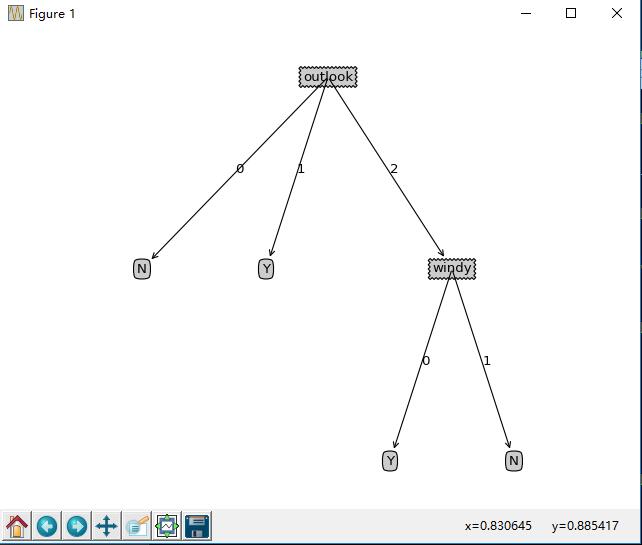Python实现C4.5(信息增益率)
Python实现C4.5(信息增益率)
运行环境
- Pyhton3
- treePlotter模块(画图所需,不画图可不必)
- matplotlib(如果使用上面的模块必须)
计算过程
st=>start: 开始
e=>end
op1=>operation: 读入数据
op2=>operation: 格式化数据
cond=>condition: 是否建树完成
su=>subroutine: 递归建树
op3=>operation: 选择熵增益率最大的为判决点
op4=>operation: 测试判决情况
op5=>operation: 划分为判决节点子树
st->op1->op2->cond
cond(no)->su->op5->op3->su
cond(yes)->op4->e输入样例
/* Dataset.txt */
训练集:
outlook temperature humidity windy
---------------------------------------------------------
sunny hot high false N
sunny hot high true N
overcast hot high false Y
rain mild high false Y
rain cool normal false Y
rain cool normal true N
overcast cool normal true Y
测试集
outlook temperature humidity windy
---------------------------------------------------------
sunny mild high false
sunny cool normal false
rain mild normal false
sunny mild normal true
overcast mild high true
overcast hot normal false
rain mild high true 代码实现
# -*- coding: utf-8 -*-
__author__ = 'Wsine'
from math import log
import operator
import treePlotter
def calcShannonEnt(dataSet):
"""
输入:数据集
输出:数据集的香农熵
描述:计算给定数据集的香农熵;熵越大,数据集的混乱程度越大
"""
numEntries = len(dataSet)
labelCounts = {}
for featVec in dataSet:
currentLabel = featVec[-1]
if currentLabel not in labelCounts.keys():
labelCounts[currentLabel] = 0
labelCounts[currentLabel] += 1
shannonEnt = 0.0
for key in labelCounts:
prob = float(labelCounts[key])/numEntries
shannonEnt -= prob * log(prob, 2)
return shannonEnt
def splitDataSet(dataSet, axis, value):
"""
输入:数据集,选择维度,选择值
输出:划分数据集
描述:按照给定特征划分数据集;去除选择维度中等于选择值的项
"""
retDataSet = []
for featVec in dataSet:
if featVec[axis] == value:
reduceFeatVec = featVec[:axis]
reduceFeatVec.extend(featVec[axis+1:])
retDataSet.append(reduceFeatVec)
return retDataSet
def chooseBestFeatureToSplit(dataSet):
"""
输入:数据集
输出:最好的划分维度
描述:选择最好的数据集划分维度
"""
numFeatures = len(dataSet[0]) - 1
baseEntropy = calcShannonEnt(dataSet)
bestInfoGainRatio = 0.0
bestFeature = -1
for i in range(numFeatures):
featList = [example[i] for example in dataSet]
uniqueVals = set(featList)
newEntropy = 0.0
splitInfo = 0.0
for value in uniqueVals:
subDataSet = splitDataSet(dataSet, i, value)
prob = len(subDataSet)/float(len(dataSet))
newEntropy += prob * calcShannonEnt(subDataSet)
splitInfo += -prob * log(prob, 2)
infoGain = baseEntropy - newEntropy
if (splitInfo == 0): # fix the overflow bug
continue
infoGainRatio = infoGain / splitInfo
if (infoGainRatio > bestInfoGainRatio):
bestInfoGainRatio = infoGainRatio
bestFeature = i
return bestFeature
def majorityCnt(classList):
"""
输入:分类类别列表
输出:子节点的分类
描述:数据集已经处理了所有属性,但是类标签依然不是唯一的,
采用多数判决的方法决定该子节点的分类
"""
classCount = {}
for vote in classList:
if vote not in classCount.keys():
classCount[vote] = 0
classCount[vote] += 1
sortedClassCount = sorted(classCount.iteritems(), key=operator.itemgetter(1), reversed=True)
return sortedClassCount[0][0]
def createTree(dataSet, labels):
"""
输入:数据集,特征标签
输出:决策树
描述:递归构建决策树,利用上述的函数
"""
classList = [example[-1] for example in dataSet]
if classList.count(classList[0]) == len(classList):
# 类别完全相同,停止划分
return classList[0]
if len(dataSet[0]) == 1:
# 遍历完所有特征时返回出现次数最多的
return majorityCnt(classList)
bestFeat = chooseBestFeatureToSplit(dataSet)
bestFeatLabel = labels[bestFeat]
myTree = {bestFeatLabel:{}}
del(labels[bestFeat])
# 得到列表包括节点所有的属性值
featValues = [example[bestFeat] for example in dataSet]
uniqueVals = set(featValues)
for value in uniqueVals:
subLabels = labels[:]
myTree[bestFeatLabel][value] = createTree(splitDataSet(dataSet, bestFeat, value), subLabels)
return myTree
def classify(inputTree, featLabels, testVec):
"""
输入:决策树,分类标签,测试数据
输出:决策结果
描述:跑决策树
"""
firstStr = list(inputTree.keys())[0]
secondDict = inputTree[firstStr]
featIndex = featLabels.index(firstStr)
for key in secondDict.keys():
if testVec[featIndex] == key:
if type(secondDict[key]).__name__ == 'dict':
classLabel = classify(secondDict[key], featLabels, testVec)
else:
classLabel = secondDict[key]
return classLabel
def classifyAll(inputTree, featLabels, testDataSet):
"""
输入:决策树,分类标签,测试数据集
输出:决策结果
描述:跑决策树
"""
classLabelAll = []
for testVec in testDataSet:
classLabelAll.append(classify(inputTree, featLabels, testVec))
return classLabelAll
def storeTree(inputTree, filename):
"""
输入:决策树,保存文件路径
输出:
描述:保存决策树到文件
"""
import pickle
fw = open(filename, 'wb')
pickle.dump(inputTree, fw)
fw.close()
def grabTree(filename):
"""
输入:文件路径名
输出:决策树
描述:从文件读取决策树
"""
import pickle
fr = open(filename, 'rb')
return pickle.load(fr)
def createDataSet():
"""
outlook-> 0: sunny | 1: overcast | 2: rain
temperature-> 0: hot | 1: mild | 2: cool
humidity-> 0: high | 1: normal
windy-> 0: false | 1: true
"""
dataSet = [[0, 0, 0, 0, 'N'],
[0, 0, 0, 1, 'N'],
[1, 0, 0, 0, 'Y'],
[2, 1, 0, 0, 'Y'],
[2, 2, 1, 0, 'Y'],
[2, 2, 1, 1, 'N'],
[1, 2, 1, 1, 'Y']]
labels = ['outlook', 'temperature', 'humidity', 'windy']
return dataSet, labels
def createTestSet():
"""
outlook-> 0: sunny | 1: overcast | 2: rain
temperature-> 0: hot | 1: mild | 2: cool
humidity-> 0: high | 1: normal
windy-> 0: false | 1: true
"""
testSet = [[0, 1, 0, 0],
[0, 2, 1, 0],
[2, 1, 1, 0],
[0, 1, 1, 1],
[1, 1, 0, 1],
[1, 0, 1, 0],
[2, 1, 0, 1]]
return testSet
def main():
dataSet, labels = createDataSet()
labels_tmp = labels[:] # 拷贝,createTree会改变labels
desicionTree = createTree(dataSet, labels_tmp)
#storeTree(desicionTree, 'classifierStorage.txt')
#desicionTree = grabTree('classifierStorage.txt')
print('desicionTree:\n', desicionTree)
treePlotter.createPlot(desicionTree)
testSet = createTestSet()
print('classifyResult:\n', classifyAll(desicionTree, labels, testSet))
if __name__ == '__main__':
main()输出样例
desicionTree:
{'outlook': {0: 'N', 1: 'Y', 2: {'windy': {0: 'Y', 1: 'N'}}}}
classifyResult:
['N', 'N', 'Y', 'N', 'Y', 'Y', 'N']附加文件
treePlotter.py
需要配置matplotlib才能使用
import matplotlib.pyplot as plt
decisionNode = dict(boxstyle="sawtooth", fc="0.8")
leafNode = dict(boxstyle="round4", fc="0.8")
arrow_args = dict(arrowstyle="<-")
def plotNode(nodeTxt, centerPt, parentPt, nodeType):
createPlot.ax1.annotate(nodeTxt, xy=parentPt, xycoords='axes fraction', \
xytext=centerPt, textcoords='axes fraction', \
va="center", ha="center", bbox=nodeType, arrowprops=arrow_args)
def getNumLeafs(myTree):
numLeafs = 0
firstStr = list(myTree.keys())[0]
secondDict = myTree[firstStr]
for key in secondDict.keys():
if type(secondDict[key]).__name__ == 'dict':
numLeafs += getNumLeafs(secondDict[key])
else:
numLeafs += 1
return numLeafs
def getTreeDepth(myTree):
maxDepth = 0
firstStr = list(myTree.keys())[0]
secondDict = myTree[firstStr]
for key in secondDict.keys():
if type(secondDict[key]).__name__ == 'dict':
thisDepth = getTreeDepth(secondDict[key]) + 1
else:
thisDepth = 1
if thisDepth > maxDepth:
maxDepth = thisDepth
return maxDepth
def plotMidText(cntrPt, parentPt, txtString):
xMid = (parentPt[0] - cntrPt[0]) / 2.0 + cntrPt[0]
yMid = (parentPt[1] - cntrPt[1]) / 2.0 + cntrPt[1]
createPlot.ax1.text(xMid, yMid, txtString)
def plotTree(myTree, parentPt, nodeTxt):
numLeafs = getNumLeafs(myTree)
depth = getTreeDepth(myTree)
firstStr = list(myTree.keys())[0]
cntrPt = (plotTree.xOff + (1.0 + float(numLeafs)) / 2.0 / plotTree.totalw, plotTree.yOff)
plotMidText(cntrPt, parentPt, nodeTxt)
plotNode(firstStr, cntrPt, parentPt, decisionNode)
secondDict = myTree[firstStr]
plotTree.yOff = plotTree.yOff - 1.0 / plotTree.totalD
for key in secondDict.keys():
if type(secondDict[key]).__name__ == 'dict':
plotTree(secondDict[key], cntrPt, str(key))
else:
plotTree.xOff = plotTree.xOff + 1.0 / plotTree.totalw
plotNode(secondDict[key], (plotTree.xOff, plotTree.yOff), cntrPt, leafNode)
plotMidText((plotTree.xOff, plotTree.yOff), cntrPt, str(key))
plotTree.yOff = plotTree.yOff + 1.0 / plotTree.totalD
def createPlot(inTree):
fig = plt.figure(1, facecolor='white')
fig.clf()
axprops = dict(xticks=[], yticks=[])
createPlot.ax1 = plt.subplot(111, frameon=False, **axprops)
plotTree.totalw = float(getNumLeafs(inTree))
plotTree.totalD = float(getTreeDepth(inTree))
plotTree.xOff = -0.5 / plotTree.totalw
plotTree.yOff = 1.0
plotTree(inTree, (0.5, 1.0), '')
plt.show()